Sakoa Boutik Hotel - Mauritius
Sakoa Boutik Hotel - Hotel Overview
The Sakoa is an intimate, family hotel, featuring 2 suites and 14 standard rooms, housed in 7 single-storey bungalows. The public areas are warm and welcoming with a reception desk, restaurant, bar and swimming pool. For laptop users, Wifi internet access is provided throughout the hotel and a computer is also available at Reception to access the internet.
There is direct access from the hotel to Trou aux Biches renowned white, sandy beach. The swimming in the lagoon here is some of the best in Mauritius.
The Sakoa is approximate 20 minutes by car from Port Louis, 5 minutes from Grand By and 1¼ hours from the airport.
Room types at Sakoa Boutik Hotel
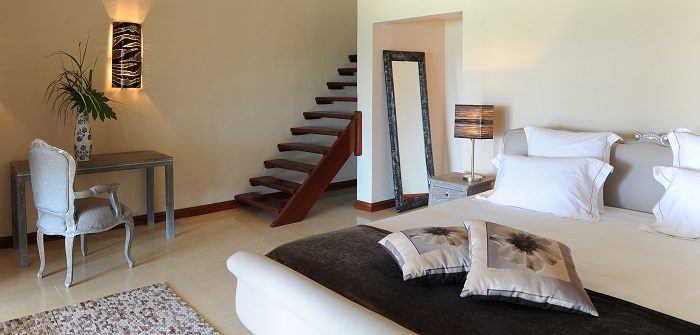
These Senior Suites are more suitable for families thanks to its large space of 100m2, a mezzanine bedroom with two single beds for children, kitchenette, and direct access to the beach
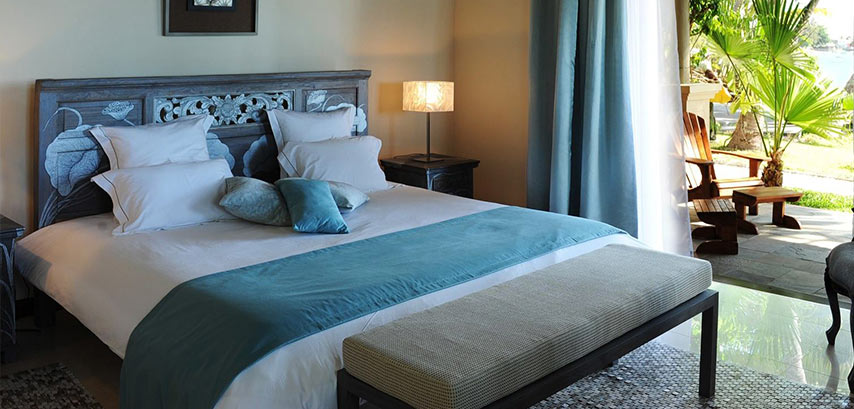
The 6 Sea View rooms offer spectacular views over the ocean. Each room is equipped with air conditioning (with individual control) and has an en-suite bathroom fitted with a shower and a toilet
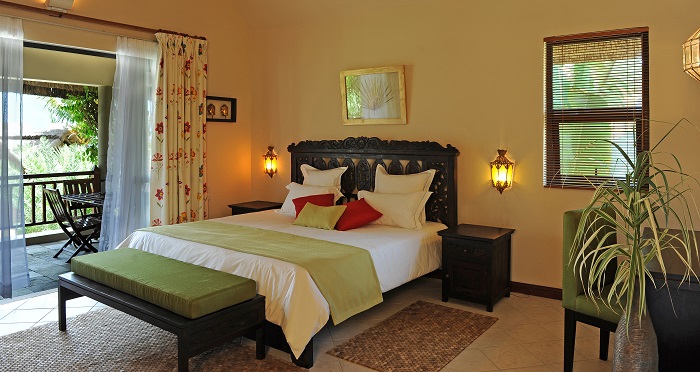
The 8 Garden View rooms offer spectacular views on the magnificent tropical garden. Each room is equipped with air conditioning (with individual control) and has an en-suite bathroom fitted with a shower and a toilet.
Sakoa Boutik Hotel - Hotel Restaurants
The restaurant borders the swimming pool, with delightful views out to sea. It serves breakfast, lunch and dinner, and specialities include seafood and local dishes.

An a la carte menu offers guests a wide choice and a set menu is also often available. The bar serves a wide variety of cocktails, as well as wines, spirits and fruit juices, and is particularly delightful at sunset. It also has a good stock of cigars.
Sakoa Boutik Hotel - Sport & Leisure Activities
For leisure moments at Sakoa you can enjoy the small hotel pool (45 m²). At your disposal: kayaks and pedal watercraft.

Water sports enthusiasts can go to the beach in Trou aux Biches for a water skiing session or a scuba diving, a boat tour, glass bottom, deep sea fishing, catamaran (with participation). Near the hotel (extra): bicycle rental, casino. Remember to bring your snorkel gear to observe the seabed of Trou aux Biches lagoon.
- Catamaran cruises
- Canoe-kayak
- Big game fishing (at extra cost)
- Glass Bottom
- Waterskiing
- Scuba diving
- Snorkelling
- Room Service
- Daily Housekeeping
- Car Rental
- Tour desk
- Credits Card accepted : American Express, Visa, Diners Club International, MasterCard and Maestro
- Laundry (at extra cost)
- Hairdryer
- Air Conditioning
- Safe
- Telephone
- Television
Sakoa Boutik Hotel - Location
What to Do in the Hotel's Region
Caudan WaterfrontCaudan, built on the old docks on the sea front, is one of the biggest shopping malls in Mauritius. It comprises of more than 170 shops, restaurants, a casino, cinemas and a 5-star business hotel. You may find a collection of local souvenir shops and other foreign brands there. You will also find the Blue Penny Museum which hosts two of the rarest and most expensive stamps in the world.
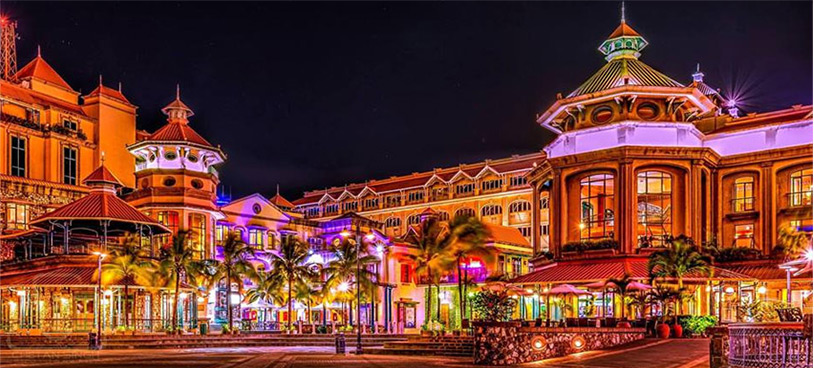
Port Louis, capital and main port of Mauritius was founded in 1735 by French governor, Mahé de Labourdonnais. Its residential population of above 150,000 is an intense intermix of races and cultures. Being a vibrant spot, it receives as many visitors during daytime - commuters, locals, businessmen and tourists. Shopping and a visit to the city museums can be very interesting and informative.
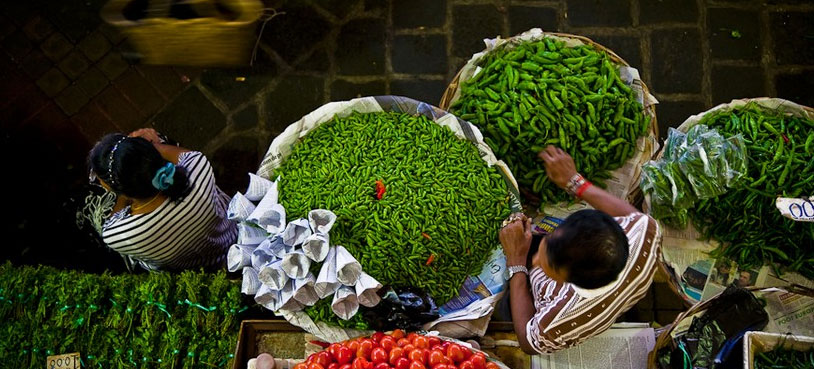
The ‘bazaar’ (or central market) is located near the harbour on Farquhar Street. It opens every day from 6am. In the colourful and bustling central market everything can be found: from food to garments. In summer, it is advisable to visit the market early, before the heat of the day.
The market is divided into the vegetable and fruit section, the meat section and the craft section. A variety of local food, crafted objects and tropical fruits are sold at affordable prices. The level of hustling there can be tiresome sometimes. Yelling their lungs out, the vendors offer almost unlimited products and services. You have to bargain hard as prices may vary from one stall to another. There is also an area where local snacks and drinks such as dholl puri and alouda are sold. Beware of eating food sold from street stalls if your stomach cannot stand unhealthy and spicy food.
Pirated versions of movies, programs and games are cheap on the street but they are of poor quality and their sale is illegal. Like in all crowded areas, be wary of your surroundings and belongings at all times.
Port Louis, capital and main port of Mauritius was founded in 1735 by French governor, Mahé de Labourdonnais. Its residential population of above 150,000 is an intense intermix of races and cultures. Being a vibrant spot, it receives as many visitors during daytime - commuters, locals, businessmen and tourists. Shopping and a visit to the city museums can be very interesting and informative.
Big Game FishingMauritius has acquired over the years a solid reputation in terms of Big Game Fishing. It has been practiced by locals for years and the country is now considered as one of the best world Big Game Fishing destinations.
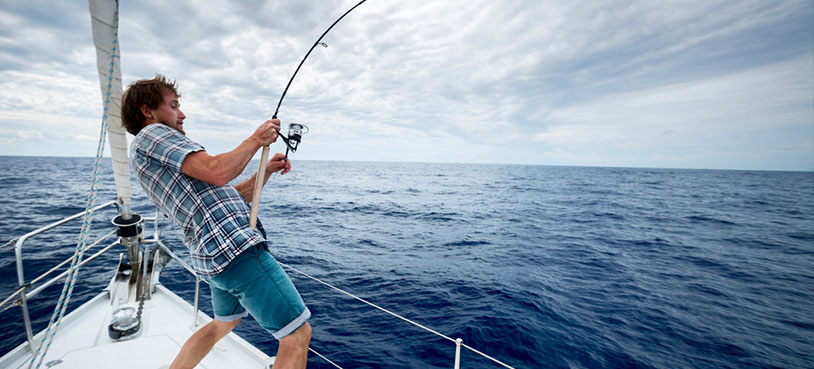
Big Game fishing targets large fish famous for their sporting qualities. The different species that can be caught in Mauritian waters include:
- Tuna
- Blue Marlin
- Black Marlin
- Bonito
- Mako Sharks
- Tiger Sharks
- Dorado
- Wahoo
- Yellow Fin Tuna
- Sailfish
- Dog Tooth
Big Game Fishing activities are offered in half-day and full-day packages by different centres across the island, with boats ranging from 36 to 47 ft for 4 to 8 passengers. Some packages sail 200 km away on fishing banks.
Big Game Fishing is also interesting for those non-fishermen, as the landscape seen as the boat is sailing is amazing and some packages provide a ride around the offshore islets north of Mauritius.
Boats are fully equipped with fighting chairs, different rods, GPS, radio, radars, safety equipment, medical kits, fire extinguishers and toilets, among others. The packages usually include snacks and beverages. They are manned by qualified staff that will help those unfamiliar with fishing techniques.
Blue Penny MuseumThe Blue Penny Museum hosts a selection of maps, photographs and engravings from different periods in history. It has also a gallery for temporary exhibitions and a souvenir boutique. The pride of the museum's collection lies in two of the world's rarest stamps: the red one-penny and blue two-pence 'Post Office' stamps.
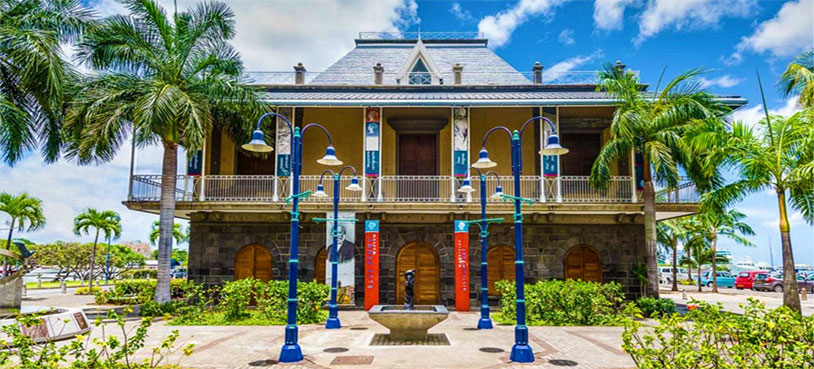
They stamps were engraved and printed locally by Joseph Osmond Barnard. In September 1847, Mauritius was the first British colony and fifth country in the world to issue postage stamps. The stamps were incorrectly printed with the words 'Post Office' rather than 'Post Paid'. These stamps now rank among the most valuable in the world.
The Blue Penny Museum, which conveys the history of the island's exploration, settlement and colonial period, provides an enriching experience.
ChinatownChinatown is a small village within Port Louis made of Chinese restaurants, shops and other small businesses. Its cramped shops sell practically everything. Many hawkers sell Chinese foods as well. The elders of Chinatown still wear traditional dress and speak with a strong Chinese accent.
La Place D’ArmesBertrand-François Mahé de La Bourdonnais
At the entrance of Place D’Armes, the statue of the French governor, Bertrand-François Mahé de La Bourdonnais, one of the founding fathers of Mauritius, dominates the view.
Built in the 19th Century, this timeless municipal theatre is one of the oldest in the Indian Ocean. It is decorated in a classic London theatre style and seats around 600 people.
Government HouseGovernment House is one of the oldest and the most important building in Port Louis. The striking French colonial structures of this building were constructed in 1740 by Mahé de Labourdonnais. It was his official residence as governor.
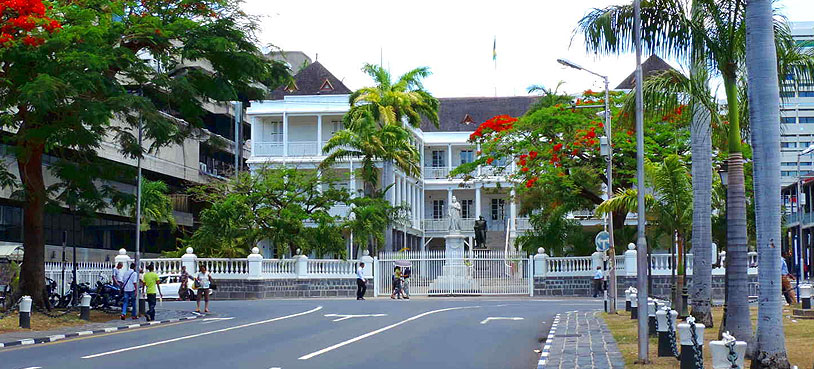
Port Louis’ most imposing boulevard, Sookdeo Bissoondoyal, lined with royal palm trees leads up to Government House. Outside stands a typically solemn statue of the British Queen Victoria representative of Mauritian history. Some huge flame trees give shade to the entrance.
Mauritius is one of the Commonwealth countries with the oldest democratic tradition
Champ de MarsChamp de Mars, founded in 1812, is another interesting place to visit especially during the racing season. Situated in Port Louis, it is the sole race-track on the island. It is the oldest race course in the Indian Ocean and the second oldest in the southern Hemisphere.
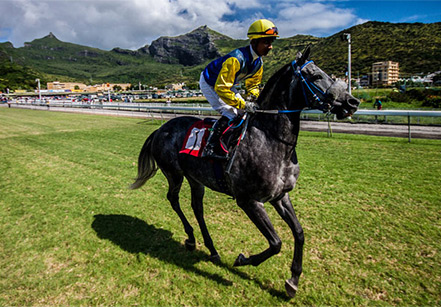
As the most popular sport in Mauritius, a high level of professionalism has been reached in the organization of races over the last decades. Thus, boosting competition levels, and creating a unique electrifying atmosphere on each race day. This is a great tourist attraction as well. You can expect around 30 000 visitors per race.
The first race-meeting usually starts in mid-May and ends normally in late November, with an average of nine horses per race. On average, some 60 horses participate on each racing day. Since the early 1990's, the Totalising System has been introduced and various betting combinations are now available. The standard of horses in Mauritius may not be as high as in Europe or U.S., but the atmosphere during a race-meeting is definitely as exciting as anywhere else in the world
Golf - NorthMauritius has a long experience as long as golf is concerned. Indeed, this sport was introduced in 1844, under the British rule, thus becoming the third country in the world to be introduced to golf.
Mauritius has set itself the objective of becoming the best golf destination in the Indian Ocean, and gradually a worldwide reference. It is worth mentioning that, in 2008, the country was the Golf Destination of the Year title by the International Association of Golf Tour Operators (IAGRO).

Today, Mauritius hosts eight 18-hole golf courses, as well as five 9-hole golf courses, most of them being situated within hotel resorts along the coastline. Most of them have been designed by famous golf course designers like Bernhard Langer, Ernie Els and Rodney Wright.
Golf courses have certified instructors, and all the materials like golf balls, clubs, caddies and carts can be hired. For those who wish to try their hand, private golf lessons are also available.
The unique thing about golf in Mauritius is that it can be practised under optimal conditions in breathtaking background scenery of gorgeous mountains and beaches that surround most of the golf courses.
Kitesurf NorthAlthough a lot of people are not aware of it, kite-surfing has its roots as far back as the early 1800s, but was formalized in the mid 1990s. It is often described as a mixture of different water and flying sports like windsurfing, wakeboarding, surfing and paragliding.
Mauritius, with its wide lagoons and South East Trade winds offers all the required ingredients for a thrilling kite surfing adventure. Mauritian waters offer opportunities both to beginners and experienced kite surfers; it is thus seeing more visitors choosing the destination for its kite surfing opportunities.
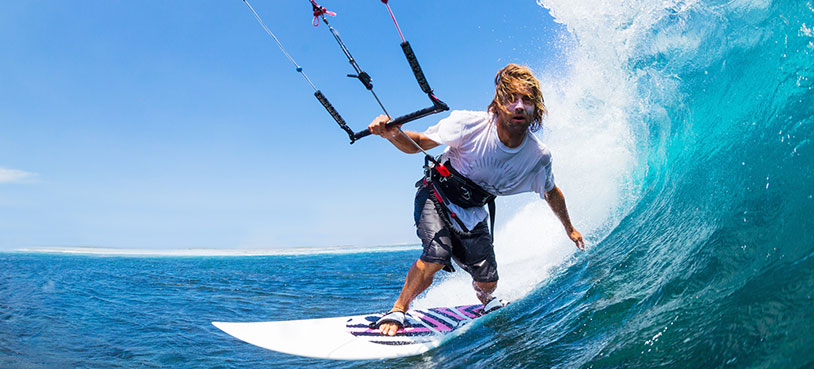
The country now counts 8 registered kite surf schools and rentals. As most water sports, these services are usually available within hotel premises, but are not limited exclusively to the hotel’s customers. Moreover, these schools main instructors have got the International Kiteboarding Organisation certification. These schools also offer kiteboard rental either per day or per week. The equipment is of international standards and regularly updated. Some schools also offer downwind and lagoon crossing trips for small groups interested in surfing around the island. However, they have to be booked well in advance for logistics reasons.
Even if experienced kite surfers are tempted to just go with the flow, it is advisable to have all necessary information, so as to know where the best spots are, what is the best time of the year and what are the precautions needed on specific spots.
When?
Since water temperature will not go below 20°C, there is no unsuitable season for kite surfing. Even the winds make it possible to kite surf all year round. However, during the months of June to January, winds can get very strong.
Where in the North?
It is not very common to kite surf around Trou aux Biches, as the winds there can occur very rarely. Surfers will then tend to go outside the lagoon, which is not very appropriate for beginners. Bain Boeuf can be a good alternative in the north. Cap Malheureux, Anse La Raie and Butte a l’Herbe are also kite surfing spots, though more suitable for intermediate to confirmed kiters. The drawback of the Northern region is that a lot of beaches there are crowded with people, and swimmers flock in the sea. Speedboats are also numerous.
Horseback riding is definitely not new to Mauritians, nor Mauritius. The least one can say is that it is a sport deeply rooted in the traditions of the country. The fact that we find here the oldest racecourse in the southern hemisphere is proof enough of that. The passion of horse racing is shared by (almost) all Mauritians. And that, irrespective of their ethnicity or social class...
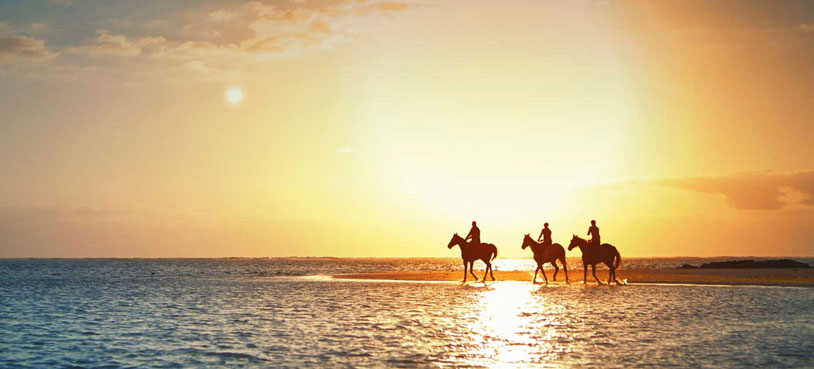
But horseback riding is not practiced only on the Champ de Mars racecourse. There are quite a few equestrian centers on the island. You can most definitely stroll down the wide (and white) sandy beaches of the island on horseback. With the lapping waves in the background, you can enjoy the sun and scenery as a bonus. During the day, the sportiest and most experienced can also take a dip in the sea with their horses! This is a unique experience that can only leave you with good memories. In the evening, enjoy the sunset as you stroll quietly, alone, with your partner or your family.
The beach is not your favorite playground ? Well, you can also enjoy horse riding in lush vegetation on beautiful domains at the heart of the island. Some even extend over 2,000 hectares. You can also find equestrian centers in various localities of the island.
In the North
Several equestrian centers will welcome you in the north of the island. You can learn to ride and jump but also acquire dressage and vaulting techniques in quarries built on a former sugar factory or just stroll enjoying the farm animals and deer along the way.
Mauritius Botanical Garden
One of the most popular attractions in Mauritius is the historical Sir Seewoosagur Ramgoolam Botanical Garden which is located in Pamplemousses. The botanical garden is considered as the oldest botanical garden in the Southern Hemisphere.
.jpg)
This awe-inspiring garden was created by Pierre Poivre in 1767, and covers an area of around 37 hectares. The centre piece of the garden is a pond filled with giant Victoria Amazonica water lilies, native to South America. The garden has a range of spices and a unique collection of 85 varieties of palm trees from Central America, Asia, Africa and the islands around the Indian Ocean. Some of the more prominent are the stubby bottle palms, the tall royal palms and the talipot palms, which flower once after about 40 years and then die. Other varieties include the raffia, sugar, toddy, fever, fan and even sealing-wax palms.
Another highlight is bird watching for the crimson hues of the Madagascar fody. There are captive populations of deer and around a dozen giant Aldabra tortoises near the park's northern exit.
Gabriel Island
.jpg)
Commonly known as Ilot Gabriel, this lush islet is among one of the most popular Northern Islets of Mauritius. It is precisely located near the Round Island and the Flat Island, just some 10 kilometres North of Cap Malheureux.
The island is an isolated haven for those seeking some quiet, relaxing moments. Being a nature reserve and home to the splendid Paille en Queue birds, the island has undeniably attracted many tourists as well as locals.
It extends over an area of 42 hectares surrounded by unspoiled fine white sand and turquoise crystal clear water. It is also very well-known for its safe snorkeling and diving sites; an idyllic destination for a day of relaxation on the beach.
The island is the most liked islet among tourists and locals for a fun and relaxing catamaran cruise. Besides the panoramic view, the island is special in the sense that it is full of lush green vegetations and indigenous fauna and flora. Its coastal vegetation is typically of sandy dune.
Mont Choisy Beach
The Mont Choisy beach lies in a very serene environment, just some kilometres away from the bustling life of Grand Bay. The beach is ideal for those who are seeking for a peaceful, and intimate getaway.
Stretched over almost 3 kilometres, from Trou aux Biches to Pointe aux Canonniers, the Mon Choisy beach is among the longest beaches in the island. It is the main highlight of the place, and is frequently visited by locals and tourists as well.
With its lush green casuarina trees flanked on one side, and the splendid emerald sea on the other, Mont Choisy beach is just perfect for those who yearn to sunbathe, or swim in the crystal clear water.
.jpg)
You might also want to indulge in fun activities such as water sports like water ski, surfing, kayaking, parasailing, or glass bottom trip to admire the glorious fauna and flora of the lagoon. Also, there is a beach soccer playground next to a football playground, where football tournaments are seldom held.
And romantics may enjoy an intimate moment while contemplating the dusky sunset sky on the beach in the evening.
Mauritius Aquarium
.jpg)
Another attraction not to be missed while touring on the Northern part of Mauritius is the Mauritius Aquarium, situated in the small coastal village of Pointe aux Piments. It is an almost 20 minutes drive from Grand Bay.
A favorite among kids, the aquarium is a little haven of many marine species in different tanks and pools in which you can get an impressive view of the aquatic life without getting into the water. There are currently 150 different types of marine animals which inhabit new ecological setting of the aquarium.
The biggest tank has a length of 15 meters and contains a multiplicity of harmless aquatic animals, which young visitors will be able to interact with. The daily feeding time for the fishes is at 11:00 am where you will have the opportunity to watch impressive animals like sharks, tortoises and moray eels.
Guided tours are not available in the aquarium but if questions come up you can ask the staff members. Furthermore you will find a small souvenir shop and a snack-bar with different lunch offers and drinks.
Red Church at Cap Malheureux
The famous Roman Catholic ‘Red Church at Cap Malheureux’ is commonly visited by tourists who wish to take vows on the island. The church is also known as Notre Dame Auxiliatrice, and was built in the small fishing village of Cap Malheureux (the unfortunate Cape). The church has a red roof which stands on the northern coast facing the lagoon and the majestic Coin De Mire Islet.
.jpg)
The church was built to honour the sailors who died in the shipwrecks which happened in the colonial period. It is also where British invaders defeated the French in 1810, another reason why the French might consider it as an unfortunate place.
Today, the church attracts many tourists for wedding photoshoot sessions due to its elegant architecture and gorgeous scenic background.
Sugar Museum and Factory
Located at Beau Plan, Pamplemousses, the Sugar Museum and Factory, commonly known as ‘L’Aventure du Sucre’, is a former sugar factory which houses one of the best museums in Mauritius. The factory was founded in 1797, and ceased working in 1999.
.jpg)
Today it serves as a museum to recount the story of sugar and slavery in Mauritius.
Most of the machinery is still in place, and former workers are on hand to answer questions about the factory and the complicated process of turning sugar cane into crystals. There are also videos and interactive displays as well as quizzes for children. At the end of the visit you will get to taste some of the 15 varieties of unrefined sugar, two of which were invented in Mauritius.
Interestingly, the museum has chosen two “mascots” to tell children the extraordinary story of sugar: two animals typical of the island, the mynah bird (martin) and the mongoose. These two mascots will guide the children all along the visit, offering entertaining questions and answers to be found under envelopes placed in various places in the museum and in the factory.
Grand Bay
Located in the North Western Coast of Mauritius, Grand Bay is a seaside village mostly visited by tourists all year round. This vibrating touristy village has a mild temperature which is ideal for those seeking to spend some quality time at the beach.
Besides its incredible beaches, this tourist hub offers many water activities such as swimming, snorkeling, diving, parasailing, bottom glass trip, catamaran cruises, undersea walk to explore the exquisite marine ecosystem, and the list is just endless.
.jpg)
You can spend an amazing day as well as an unforgettable night where you have a great choice of nightclubs, bars, and lounges. Special themed parties are usually organized in most of the nightclubs such as ‘Les Enfants Terribles’, Banana Club, Azalle Lounge Club, OMG and others.
Furthermore, you will have a range of facilities such as shopping malls, supermarkets, accommodation, banks, ATMs, and restaurants. You will find excellent places where you can have scrumptious meals, featuring both local and international cuisine, depending on your taste. You can also check out Le Capitaine, Le Tandoor, Boulette Ti Kouloir, Luigi’s, Happy Rajah, Bistrot de Bacchus, and many other restaurants in the area to delight your taste buds.

















.jpg)
.jpg)
.jpg)
.jpg)
.jpg)







